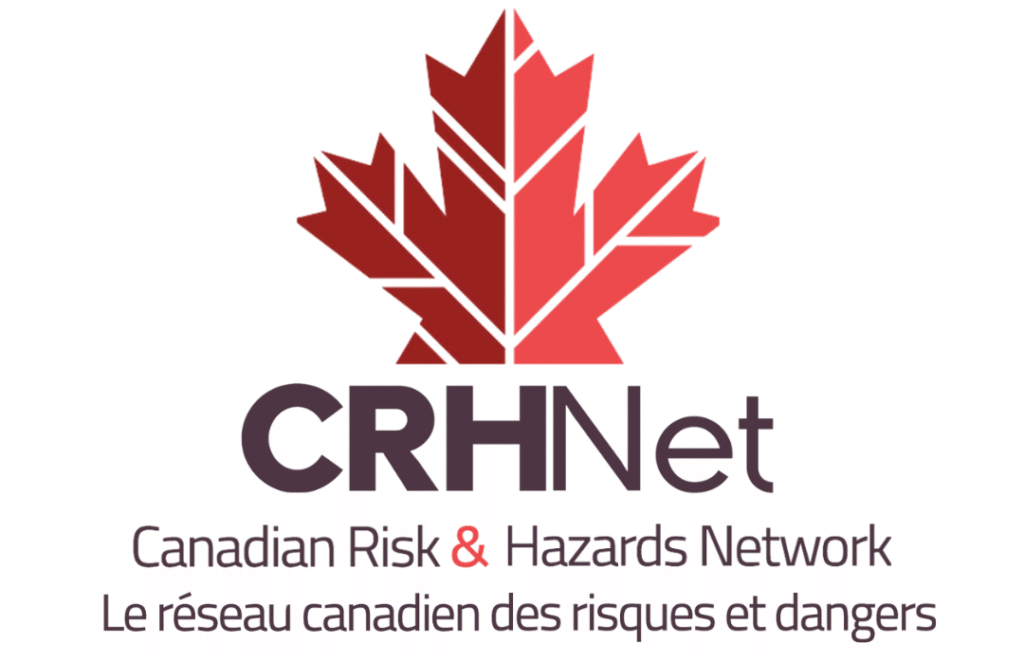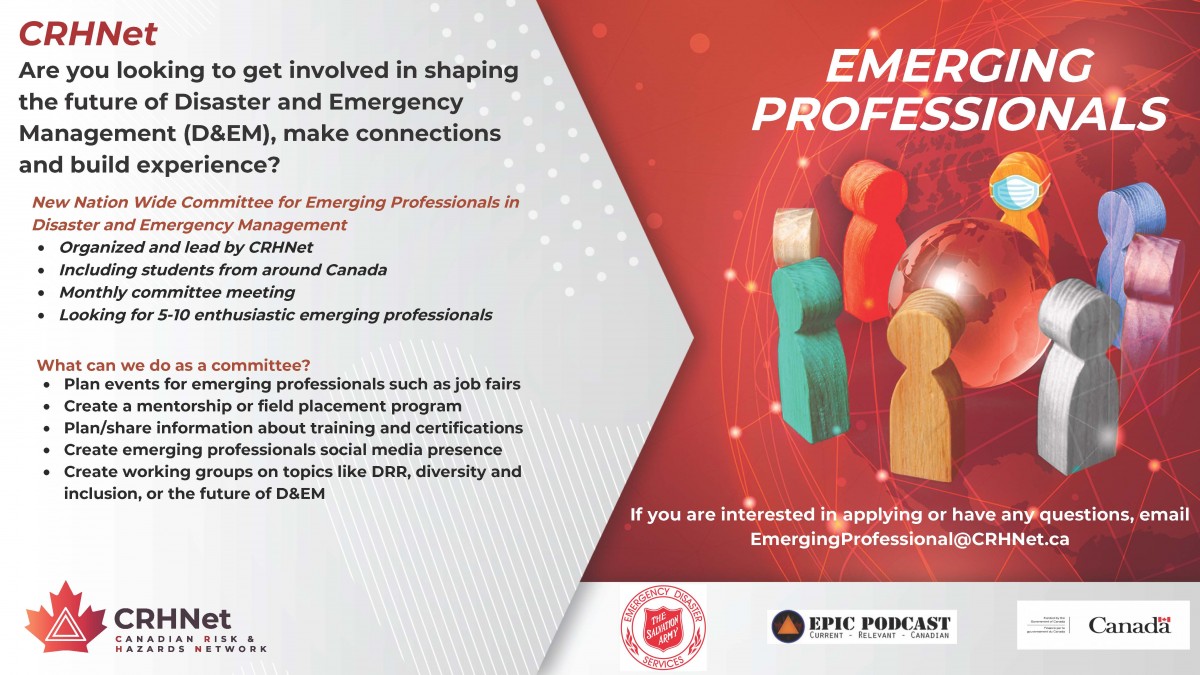By: Brooklynn Hole & Kyle McElhinney, Emerging Professionals (EP) Committee
It started with two simple questions: “What are the needs of emerging professionals and students”, and “how can CRHNet support these needs through future opportunities and events?” To find this answer, the Emerging Professionals (EP) Committee reached out to self-identified students, recent alumni (<2 years from graduation), and emerging professionals (<4 years of working experience) in the field of Disaster and Emergency Management (D&EM) and Disaster Risk Reduction (DRR) to complete a 20-question survey. This information is now used by the EP committee to design our opportunities (e.g., events, training, etc.) to better support EPs and their development. We are sharing the survey findings publicly to have a written record of the needs identified by emerging professionals.
As EPs and students are the future of D&EM and DRR in Canada, it is essential that we identify and address their needs in order to support their success and longevity in the field.
Before we present the findings of this survey, we would like to acknowledge that there are some limitations to the data collected. For example, although CRHNet is a national network, we were not able to capture the participation from EPs across all provinces and territories. In addition, we recognize that the number of survey results is not statistically significant, however, we believe the input from those who did participate is a valuable insight into the ways we can support emerging professionals.
Defining an Emerging Professional
When we began planning for this survey we needed to start by determining who our target audience was – who are emerging professionals? We define an emerging professional as a current student (full or part-time) or recent alumni within 2 years of graduation; and with less than 4 years of working experience. So we used this as the starting point to identify our target audience.
We wanted to dig a little deeper into the question of who are emerging professionals. Like many surveys, we asked participants for their age, to see if there was any correlation between those who identified as an emerging professional and age.
Interestingly, we found that those who identified as emerging professionals mostly fell into two age brackets. 47% of respondents were over the age of 40, and 40% were under the age of 29.
Along with age, we were interested in what types of education emerging professionals had, to allow the EP Committee to facilitate training and events to work alongside their existing education to better provide a breadth of knowledge for emerging professionals
From our results, Bachelor’s degrees are the most represented form of education with 37% of respondents holding one. Emerging professionals with Master’s degrees and Certificates and diplomas were also represented, with 27% of respondents holding a certificate or diploma, and 23% holding a master’s degree. Only two respondents had completed a PhD, and only one respondent had attended a trade school. We also asked if this education was within the field of D&EM and the overwhelming majority (83%) indicated that it was.
What excites Emerging Professionals about the industry?
With an industry as multifaceted and fast-growing as D&EM and DRR, we wanted to know what is bringing people to the field. Finding out what fascinates and excites people will give us a better understanding of what we can do to better support emerging professionals by offering opportunities that line up with their passions.
Emerging professionals are most excited to assist their communities, organizations, and country. A motivating factor and gap that many respondents outlined was assisting underserved populations and identifying accessibility gaps for people with disabilities. There was also excitement around growth and professionalization within the industry. Specifically, respondents acknowledged that there were some knowledge gaps and expressed interest in researching and identifying these gaps, indicating a commitment to advancing the discipline.
While not the only aspects, emerging professionals want to be an integral part of response and mitigation activities as it allows them to work and find gaps to strategize to address crises and adapt to these challenges helping to diversify the field and the tools we use.
Overall, emerging professionals are excited and motivated by the diverse challenges and opportunities to positively impact communities, whether through response and recovery efforts, research and innovation, or collaboration with various stakeholders.
How confident are Emerging Professionals entering the industry?
In the dynamic and ever-evolving landscape of D&EM and DRR, readiness is paramount. We found it important to ask EPs how prepared they felt entering into the industry. Respondents were asked to rank their level of readiness on a scale of 1-5 with 1 being not prepared and 5 being very prepared. Generally, EPs felt somewhat prepared and ready to enter the field, with 23% of respondents selecting “5” (very prepared), 30% selecting 4 and 40% selecting “3” (neutral). Only 7% identified as 2 or lower, indicating a feeling of unpreparedness towards entering the field. Many of the respondents expressed that they had the theoretical knowledge needed, but emphasized the importance of more practical experience and hands-on learning, which can sometimes be hard to participate in depending on location, and opportunities presented.
Events and Opportunities
The desire for more practical learning is supported by the results we found when asking participants what types of events they were interested in attending. We found that EPs not only wanted opportunities to enhance their skills but also to foster collaboration and participate in the exchange of knowledge.
At the forefront of their preferences are exercises, with 83% of respondents expressing interest. These hands-on sessions would allow EPs to apply the theoretical knowledge learned in school in more practical scenarios enabling participants to refine their critical thinking and problem-solving skills.
In an increasingly digital world, 80% of respondents indicated interest in attending webinars and online topic-focused discussions. These events offer the opportunity for the exchange of ideas, insights and best practices. We found that 73% of respondents wanted a better understanding of IMS and ICS. In an environment of increasing risks and challenges, the respondents considered proficiency in managing complex systems and responding to emergencies as paramount.
Lastly, 73% of respondents indicated an interest in think tanks and collaborative research. This would provide an environment for brainstorming and idea creation, and provide a forum to bring together diverse perspectives and expertise.
Delivery Methods
Over the last 4 years, there has been a shift towards online delivery methods for events and trains. This has been propelled by the adoption of virtual platforms, in the wake of the COVID-19 pandemic. As in-person events once again become more accessible coming out of the COVID-19 pandemic, we wanted to know if emerging professionals would like to attend events in person or if remote and online events have solidified their position as a new norm.
The findings from our survey revealed that 50% of respondents would like the option of more hybrid events, blending the best of virtual and in-person experiences. These events would offer the benefits of convenience and accessibility of online participation while still allowing for the benefits of face-to-face interactions. A quarter of respondents (25%) indicated a preference for a purely online event. While another quarter (25%) expressed an interest in attending traditional, in-person events. The diversity of preferences shows the importance of offering a range of delivery methods to cater to the needs and preferences of its participants
Barriers to Participation
We understand that there are any number of barriers that an emerging professional may face that impede their ability to attend events and training sessions. We asked our survey participants to identify which barriers they faced when accessing professional development opportunities. It is no surprise that in our current environment, “time” was indicated as the biggest barrier to attending events. 63% of respondents indicated they do not have enough time to attend professional development sessions. With demanding work schedules, personal commitments, and the ever-increasing risk of environmental and political disasters, carving out time for professional development can be difficult.
Even when there is time to invest, 60% of respondents indicated that there is just simply a lack of suitable opportunities. Some indicate location, limited access to relevant events, and a scarcity of training programs as barriers they have faced when looking for additional training or events. With the rising cost of living, 57% of our respondents indicated cost as a barrier. From registration fees to travel expenses and accommodation costs, it can be difficult for emerging professionals who are early in their careers or operating on tight budgets to dedicate a large amount of money to professional development.
Conclusion:
Emerging professionals and students are seeking opportunities that foster growth, collaboration, and innovation. As the CRHNet EP Committee, we have a crucial role to play in providing opportunities that address these needs. We have come up with several strategies that not only the CRHNet can take advantage of when planning events but the industry as a whole:
- Flexible delivery methods: Embrace online platforms, webinars, and virtual/hybrid events, to make learning more accessible and convenient for people. Allowing individuals to participate without the need for extensive travel or time away from work. Additionally, awareness of the time zones across Canada and consider the timing of the events for participants – consider the availability of recordings.
- Subsidized or free programs: Finding opportunities to cut costs or subsidize the cost of attendance for programs offered without compromising their integrity. This could be through partnerships, sponsorships, or grants. Lower-cost programming is more accessible and desirable for emerging professionals.
- Focus on practical skills: In addition to theoretical-based events, EPs would like to see a focus on training and events that address core competencies and skills for career advancement.
- Networking: Beyond traditional training, emphasize the importance of networking opportunities at events. Facilitate and encourage connections between emerging professionals and industry leaders, mentors, and peers.
By hosting workshops, seminars, and networking events tailored to the evolving landscape of disaster and emergency management, we can facilitate skill development, knowledge sharing, and professional connections for emerging professionals throughout Canada. As the CRHNet continues to adapt, it has the potential to become an indispensable resource for both aspiring and established professionals, driving progress in the face of future challenges.

